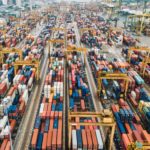When thinking about why some countries are rich and others are not, it’s natural to start by asking: how is output created in the first place?
The obvious answer is that output is made by a worker, who uses tools and materials to produce some kind of good or service. In economics, the first is called labor, while the second is called capital.
Jim the barber uses the capital of scissors, trimmers, electricity, and building space to provide haircuts.
Elijah the software engineer uses the capital of a laptop, various computer programs, and an office building to produce code.
And so on – you get the picture.
And the idea is, to grow the economy’s output, a country would need to grow its capital stock and ensure adequate labor is available.
However, if we think about it some more, we can see that it doesn’t make sense to group all laborers together as though they’re identical. Jim the barber has certain skills that allow him to do his job, but won’t allow him to do the software engineer’s job – at least, not without investing years and thousands of dollars to acquire those same skills. As a further point, suppose we have a third character, Jane, who is chronically sick and exhausted. She will have a much harder time learning in school and being as productive as the healthy Jim and Elijah.
We see then, that labor is not equal, the quality of the laborers in the USA is different than the quality of laborers in Tanzania. And even in the USA, the quality of the labor differs, person to person. Economists use the concept of “human capital” to refer to the varying skills, knowledge, and health that workers possess.
What Exactly is Human Capital?
In economic terms having more human capital makes you a more productive worker. What makes someone productive is a long list, and includes not only skills of the trade, but also motivation, attitude, grit, teamwork, empathy, critical thinking, and conflict resolution just to name a few. You get the idea – the knowledge and skills that enable you to accomplish more, are all part of human capital.
Skills and knowledge are mostly gained through education, from pre-school on to university and trade school. Generally, the more education someone has the more human capital they have developed. I say generally, because what matters more than quantity, is the quality of the schooling. It’s a matter of: did you develop skills and knowledge, not: did you get a piece of paper? Contrary to popular opinion, it’s the human capital, not the piece of paper that is the reason for the higher pay college graduates have over non-graduates.
Similarly, health is another obvious component of your productivity. If you’re feeling sharp and energized day to day, you will get more done than someone sickly and tired – we would expect the healthier individual to produce and thus earn more than the sickly individual.
Why is it Called Human “Capital“?
Let’s start with capital itself. If we were to describe what “capital” is, it would have the following characteristics:
- Requires investment to produce and install it in a physical location
- Depreciates or wears out over time
- Since it increases productivity, the owner of capital earns a return
An example of capital is an airport. Airports increase productivity by enabling travel to the city to be easier, and thus increase business in that area. The airport’s construction was funded by bonds (loans) or direct investment of cash. The airport will earn enough income to pay for the bonds as well as a return on the cash invested into it (otherwise the cash would have been invested elsewhere). Over time, the airport will wear out and will require additional investment to be maintained.
Similarly, human capital is analogous to traditional capital:
- Investment is required to install the human capital inside someone’s brain.
- The cost takes the form of years of schooling, on the job training, and wages that weren’t earned so that the individual could get that training. Similarly, vaccines and other disease treatments cost money and must be invested to make sure the person reaches full health.
- When the person dies, the human capital dies too.
- The additional skills, knowledge, and health make the person more productive, than if they didn’t have those.
- The private return to education, globally, is 9% per each additional year of schooling.
Evidence That Human Capital Affects Wealth
On the societal scale, in 2003 it was estimated that 6.2% of US GDP (gross domestic product) was spent on education. If we were to account for the labor that could have been produced instead, the total cost to society is estimated to be 12.4% of GDP1 – so yeah human capital is a major source of investment.
We defined human capital earlier as the combination of skills, knowledge, and health a person has.
Measuring health is most straightforward – a good measure is life expectancy at birth, how many years a baby born in a certain year is expected to live.
The relationship, as we would expect, is strongly positive, richer countries have better health and thus more human capital. It is likely that being richer also causes health to improve, as people can afford to spend more on improving their wellbeing. However, it is intuitive and supported by other evidence that healthier workers will produce more output per person than sickly workers.
Measuring skills and knowledge is trickier, because as noted earlier, it’s quality not quantity that matters. We can measure skills and knowledge of a country by looking at the average test scores of its children.
Again, as we expect, we see that children in rich countries have more human capital in the form of education than do children in poor countries. Once again, it is true that richer countries choose to spend more on education, but it’s equally obvious that the higher human capital is also a cause for a nation’s wealth. Just consider how ridiculous it is to imagine Microsoft, the iPhone, or Tesla being developed in Ukraine or Mexico – not likely at all.
How Big of an Effect Does Human Capital Have on Wealth?
While correlation certainly is not causation, models that incorporate human capital (such as the Solow Growth model with human capital) and other evidence suggest that for the countries with the lowest levels of human capital such as Liberia, Niger, or Mali, raising human capital to the level of the US would raise their GDP per capita by 2.5 times. Having the ability to more than double wealth per person means human capital is a big deal in explaining economic growth.
Human capital has very high returns initially, as you teach someone to read and write, and gradually diminishes as you teach them more and more advanced things. This implies that the most cost-effective things a poor country can do to boost wealth and economic growth is to invest in human capital.
This means investing in medicines and medical treatments for the young, adequate food supply, and improving their provision of public education.
Human capital is now recognized as so important, that the World Bank has a worldwide human capital index, that measures how close each country comes to achieving “full human capital” (14 years of education and good health outcomes). Through this, world leaders are being made aware of the importance of investing in the human capital of their nation.
Some Takeaways for You
In the modern-day environment of rapid technological innovation, having more human capital means you will be better suited to adapt to fast-paced working conditions. Economic evidence shows that during periods of high technological change, like we are experiencing now, the wealth gains primarily go to those who are able to work with this new technology.
This requires a conscious investment of not only time and money, but also effort. Remember, the point earlier that it’s what you know and can do that is compensated, not the piece of paper or surface-level knowledge you have.
Installing this human capital into your brain circuitry, however, is not a fun process. Psychological research shows that the development of skill is accompanied by mental pain and strain – so be forewarned.
Thus, if you are interested in developing your skills it probably isn’t that effective to casually read a book, watch a documentary, or merely watch some online lectures. Real learning requires deep focus and engagement with the material, testing yourself to see how much you really understood, and trying to actively apply your new knowledge. This is the reason why learning most often happens at a university, under the system of exams, papers, and grades – though there is nothing stopping you from learning on your own.
At the same time, there is evidence that developing your knowledge of time management techniques, growth mindsets, and other soft skills can lead to increased productivity and thus, higher earnings.
In short, in this ever-changing world, the best strategy for success is to commit to being a lifelong learner. Even something as unrelated to your career like learning to play the piano or to speak French will develop your human capital. Today, demand for skills like creativity, problem-solving, and critical thinking are becoming more important than specific skills – as these are things that technology cannot replicate.
[expand title=”Sources”]
- Kendrick, John W. 1976. The Formation and Stocks of Total Capital. New York: Columbia University Press. Via Economic Growth by David Weil
[/expand]



